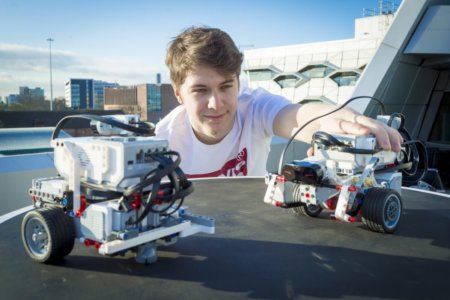
With climate change steadily creeping up on us, efforts to tackle the dangers posed to our planet are more important than ever. Fearless young leaders like Greta Thunberg have gone the extra mile, but it’s undeniable that everyone needs to play their part — and they need to start now.
Luckily, many universities are rising up to the challenge. Nowadays, students have many options to pursue an education that will help bridge the gap between our planet and human impact — typically, in the fields of science and technology.
Here are four universities offering programmes that focus on sustainability,
Aberystwyth University: Faculty of Earth and Life Sciences
First established in 1872, and now celebrating its 150th anniversary, Aberystwyth University is one of the UK universities most dedicated to reducing the effects of humans on the planet. The University declared a climate emergency in 2019 and is committed not only to be carbon neutral, but also carbon replenishing by 2030. It has taken clear steps to divest from fossil fuels, reduce energy consumption, shift to renewable energy and invest responsibly.

Aberystwyth University is one of the UK universities most dedicated to reducing the effects of climate change. Source: Aberystwyth University
Recently, Aber received a green light for the development of a 2.9 million pounds solar farm and is leading on one of the five demonstrator projects that is part of a 30 million pound investment by the UK government to remove greenhouse gases from the atmosphere. The university has also played leading roles in the development of an interactive tool to help conserve and restore the world’s mangrove forests — at least six projects to raise awareness and understanding of the impacts of climate change in Ireland and Wales — and research to map and predict the state and dynamics of Wales’s landscape. This is in addition to the transdisciplinary work performed by the research groups at the Centre for Glaciology; Cultural and Historical Geography; Earth Observation and Ecosystem Dynamics; Earth Surface Processes; New Political Geographies; Quaternary Environmental Change; and Interdisciplinary Centre for Environmental Microbiology and Geochemistry.
Led by the Faculty of Earth and Life Sciences, the university has a multitude of programmes to choose from to best guide the next generation of climate warriors. The BSc in Environmental Earth Science provides students with the core field skills needed to solve the environmental problems being faced by society. Climate change and sustainability themes are also embedded in the curricula for the various Geography and Biology degrees available. More specifically, there is the BSc in Biology and Climate Change, where students learn what creates the Earth’s climate, and the various factors driving climate change.
Postgraduate students can choose the MSc in Environmental Change, Impact and Adaptation, which draws on world-leading expertise in both the natural and social sciences to address contemporary environmental challenges. Should students choose to reduce their carbon footprint by opting for distance learning, Aber also offers an online programme in the form of the MSc in Sustainable and Efficient Food Production.
While many programmes geared towards addressing climate change issues typically fall within the sciences, Aber understands that this isn’t just a challenge for scientists. Therefore, it offers a range of climate change related degrees across diverse subject areas, spanning the arts and humanities as well as the sciences.To find out more about Aberystwyth University, visit their website here or apply for a programme here. You can follow Aberystwyth University on Facebook, YouTube, Twitter, Instagram.
Tampere University of Applied Sciences: Faculty of Engineering and Natural Sciences
With a mission to address the greatest challenges facing our society and to create new opportunities, Tampere University of Applied Sciences (TAMK) is building a new model for higher education and research in Finland. The university’s research and education, for example, in the fields of economics, technology, health and society, promote multidisciplinary learning and lifelong partnerships.

Tampere University is one of the best applied sciences universities in Finland, Source: Tampere University of Applied Sciences
Here, the worlds of engineering and sustainability collide. The university’s Faculty of Engineering and Natural Sciences offers degree programmes in English such as Science and Engineering – Natural Sciences and Mathematics and Science and Engineering – Computing and Electrical Engineering.
At the postgraduate level, a wide range of master’s programmes are on offer, including Automation Engineering; Factory Automation and Robotics; Business and Technology; Industrial Engineering and Management; Environmental Engineering; Engineering Materials Science; Photonics Technologies; and Erasmus Mundus Europhotonics.
Students who take on the Environmental Engineering programme will gain valuable industry experience and be inspired by world leading academics in hydrology, hydraulics, water resources and waste management. They are taught by consultants who have led major international projects in sustainable land, water and coastal resource management.
TAMK has designed a unique curriculum aligned with the top institutions of the world, ensuring students graduate with the ideal combination of advanced technical and professional skills valued by employers, and a higher level qualification that is recognised globally.
As for research at TAMK, it takes place in the Centres of Excellences (CoE) — promoting health and well-being for all sections of the population, building efficient and safe environments, and ensuring that social responsibility is respected.
Charles University: Faculty of Science
Founded in 1348, Charles University is the largest and most renowned Czech university. It is also the best-rated Czech university according to international rankings. The university has one aim: to continue to enhance its prestigious status as a research university.

Charles University is the best-rated Czech university according to international rankings. Source: Charles University
Charles’s Faculty of Science is home to 29 departments, three museums and a large Botanical Garden. Students can take their pick from programmes in Biology, Chemistry, Geography and Geology.
As the academic year at CU is split into two semesters, students start each semester with a lecture period (4.5 months) and end with an exam period (one month). Their learning takes place within and beyond classrooms, in the form of lectures, exercises, seminars etc. At the end of the semester, there are also field courses or excursions.
The university’s research is just as dynamic. World-class research teams include the internationally renowned Czech Institute of Egyptology. Here, it’s common for staff to participate in a range of major international research projects – including the CERN (European Organisation for Nuclear Research) programme.
Through the university’s scientific achievements and major research areas, Charles’s scientists and students are often nominated for prestigious domestic and international awards for their discoveries and merits. Graduates benefit from one of the highest employment rates of any population segment in the Czech Republic.
University of Padua, Department of Geosciences
To prepare students at all levels to meet environmental challenges and succeed in industry, government, business and academia — that’s the mission of the University of Padua’s Department of Geosciences. As one of Europe’s oldest and most prestigious institutions, Padua is committed to advancing the pursuit and dissemination of education amongst students from all over the world.

The University of Padua is one of Europe’s oldest and most prestigious universities. Source: University of Padua Facebook
The Department of Geosciences offers a wide range of programmes targeted towards increasing sustainable knowledge and scientific knowledge in Earth Sciences. In particular, it specialises in providing specific training for careers in geology. Students can choose from undergraduate studies in Geological Sciences to a range of postgraduate master’s degrees in Environmental Geology and Earth Dynamics, Geology and Technical Geology, and Geophysics for Natural Risks and Resources. There’s also a PhD in Geosciences for those interested in scientific research within the field.
This is backed up by a campus that aims to provide students and faculty members with the tools they need to conduct research that will aid our planet. The department comprises the Geosciences Library — part of the Science, Pharmacology and Pharmaceutical Sciences Library cluster — and 30 laboratories offering a wide range of equipment for highly specialised analyses.
It’s also host to the laboratories of the Interdepartmental Research Center for the Study of Cementitious Materials and Hydraulic Binders (CIRCe), among others. Combined, it’s no wonder that Padua is Italy’s best university for research quality.
Apart from this, the department regularly conducts and publishes their research findings on geosciences, from marsh-resilience to sea-level rise to discovering new techniques that allow for the analysis of materials with very low birefringence.
*Some of the institutions featured in this article are commercial partners of Study International










